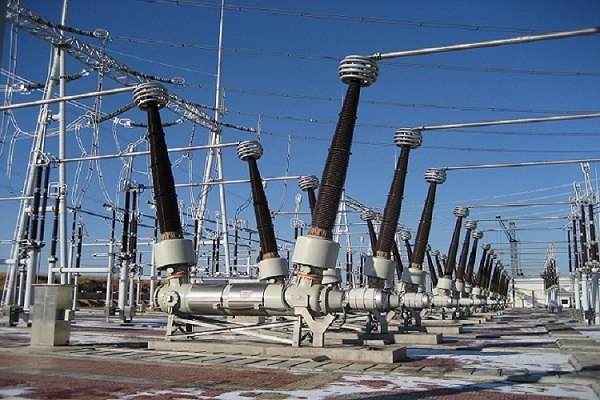
The routine tests for AC circuit breakers are performed for the purpose of ensuring the quality and guaranteed performance of the material, design and assembly of the circuit breaker and are made on each apparatus manufactured.
When the circuit-breaker consists of more than one interrupter per phase, i.e. V-, or T-shaped breaking units, the routine tests are performed on the circuit-breaker assembled in transport units. The transport units (post insulators and breaking units) are in this case mounted on special frames to enable connection to the operating mechanism.
The following items are the routine testing items of AC High voltage circuit breaker according to IEC 62271-1,IEC 62271-100 Standards:
1-Dielectric test on the main circuit:
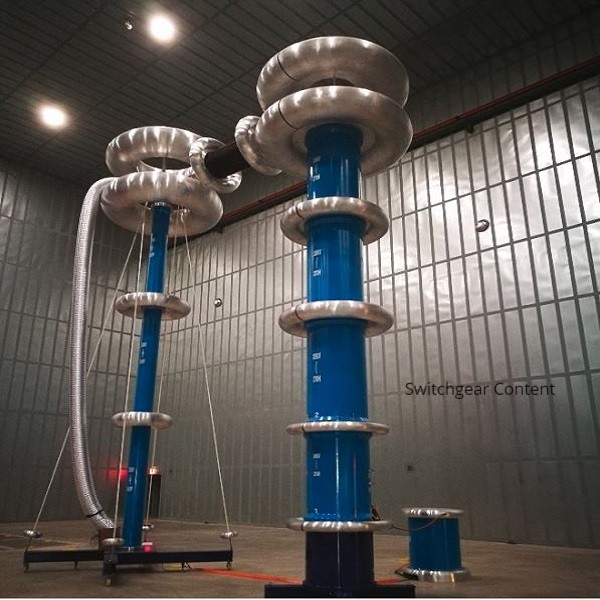
A dry, short-duration power-frequency voltage test shall be applied.The test voltage shall be that specified in column 2 of the following tables , according to the relevant IEC standards.In these values, the altitude factor should be considered.The power frequency voltage test is performed with the circuit-breaker in open position only. This is valid for both single- and multi unit circuit-breakers.
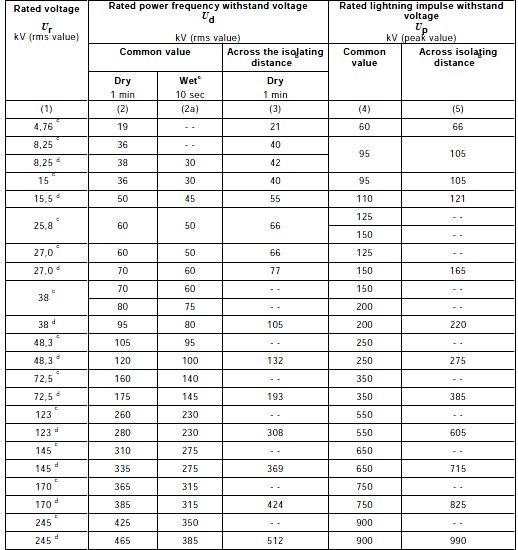
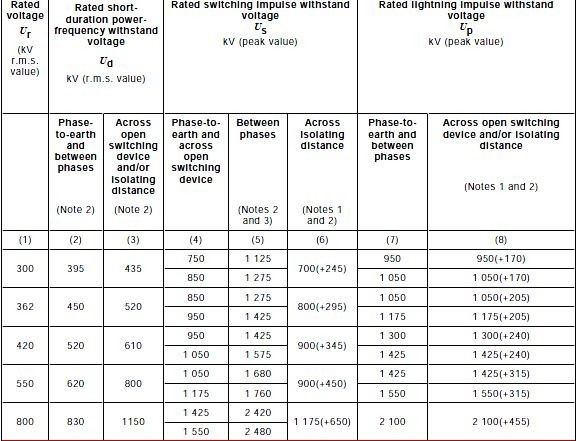
In the case of circuit breakers constructed by assembling identical breaking and making units in series, the test voltage to be applied across each single unit, when open, shall be the higher fraction of the total withstand voltage resulting from actual power-frequency voltage distribution with the circuit-breaker fully open and one terminal earthed.
Connect the above test for Single interrupter circuit-breaker and Multi interrupter circuit-breaker is according to below pic:
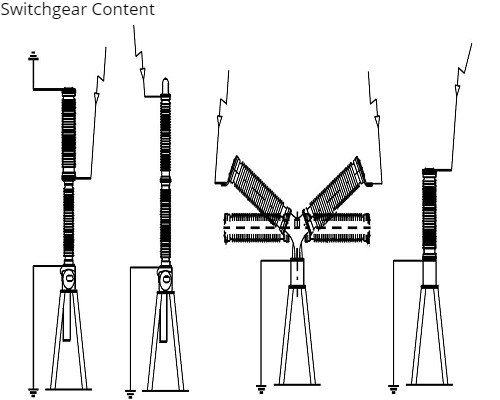
2-Dielectric test on auxiliary and control circuits in operating mechanism:
A:Inspection of auxiliary and control circuits, and verification of conformity to the circuit diagrams and wiring diagrams:
The nature of the materials, the quality of assembly, the finish and, if necessary, the protective coatings against corrosion shall be checked. A visual inspection is also necessary to check the satisfactory installation of the thermal insulation.The conductors and cables shall be checked for proper routing.
B:Functional tests:
A functional test of all low-voltage circuits shall be made to verify the proper functioning of auxiliary and control circuits in conjunction with the other parts of the disconnector switch . The test procedures depend on the nature and the complexity of the low-voltage circuits of the device.Check to function of Counter, Auxiliary contacts, Thermostat settings ,Local/Remote operation.
C:Verification of protection against electrical shock:
Protection against direct contact with the main circuit and safe accessibility to the auxiliary and control equipment parts liable to be touched during normal operation shall be checked by visual inspection.
D:Dielectric tests:
Only power frequency tests shall be performed.The test voltage shall be 1 kV or 2 kv with a duration of 1 s with 50 or 60 HZ frequency.This test perform on terminal and motor and auxiliary switch and control circuits.
3-Measurement of the resistance of the main circuit:
For the routine test, the d.c. voltage drop or resistance of each pole of the main circuit shall be measured under conditions as nearly as possible similar, with regard to ambient air temperature and points of measurement, to those under which the corresponding type test was made.The measured resistance shall not exceed 1,2 × Ru, where Ru is equal to the resistance measured before the temperature-rise test.
4-Tightness test :
Routine tests shall be performed at normal ambient air temperature with the assembly filled at the pressure (or density) corresponding to the manufacturer’s test practice. For gas-filled systems sniffing may be used.
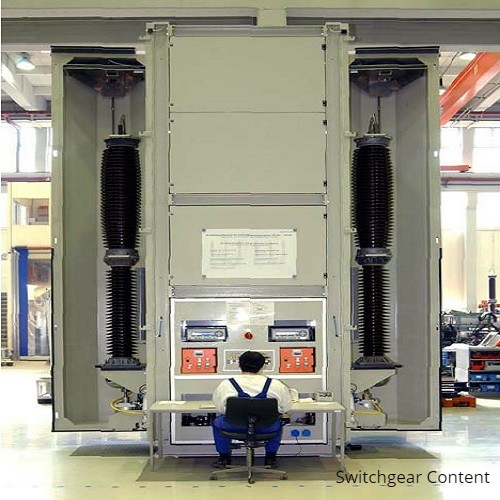
A:Controlled pressure systems for gas:
Find the relative leakage rate F re by measuring the pressure drop over a time period.
B:Closed pressure systems for gas:
The test may be performed at different stages of the manufacturing process or of assembling on site, on parts, components and subassemblies.For gas-filled systems leakage detection by using a sniffing device may be used.
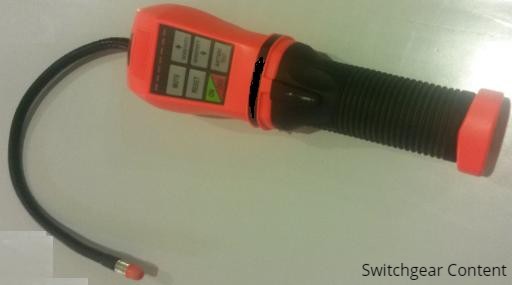
C:Sealed pressure systems:
* Switchgear using gas:Tightness tests on such switchgear and controlgear are performed in order to determine the expected operating life for the sealed pressure system.
* Vacuum switchgear:
Each vacuum tube shall be identified by its serial number. Its vacuum pressure level shall be tested by the manufacturer of the vacuum interrupter.The test results shall be documented.After assembly of the switchgear device the vacuum pressure level of the vacuum tubes shall be tested by a significant routine dielectric test across the open contacts. The test voltage shall be stated by the manufacturer.The dielectric test shall be carried out after the mechanical routine test as required by the relevant product standard.
5-Design and visual checks:
The switchgear and controlgear shall be checked to verify its compliance with the purchase specification.This items must be check :
– the language and data on the nameplates;
– identification of any auxiliary equipment;
– the color and quality of paint and corrosion protection of metallic surfaces;
– the values of the resistors and capacitors connected to the main circuit(if any).
6-Mechanical operating tests(Timing test run by semi-automatic test program):
Mechanical operating tests should be made on the complete circuit-breaker.For all required operating sequences the following shall be performed and records made of the closing and opening operations measurement of operating times.
The mechanical travel characteristics can be recorded directly, using a travel transducer or similar device on the circuit-breaker contact system or at other convenient locations on the drive to the contact system where there is a direct connection, and a representative image of the contact stroke can be achieved. Below Fig show mechanical contact curve:
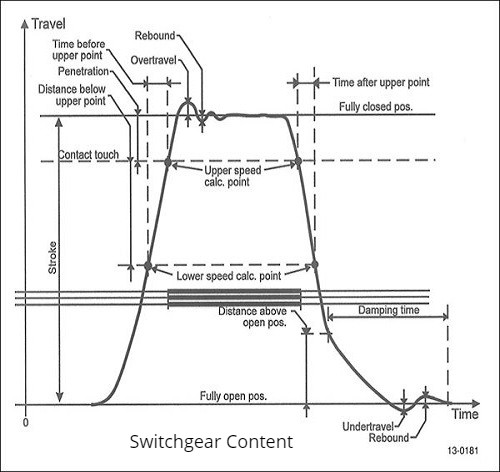
The number of points recorded shall be sufficient to derive the time to, and contact speed at, contact touch and contact separation, together with the total travel time.
Mechanical operating tests shall include the following:
a) at maximum supply voltage of operating devices and of auxiliary and control circuits :
− five closing operations;
− five opening operations.
b) at specified minimum supply voltage of operating devices and of auxiliary and control
circuits:
− five closing operations;
− five opening operations.
c) at rated supply voltage of operating devices and of auxiliary and control circuits :
− five close-open operating cycles with the tripping mechanism energised by the closing
of the main contacts;
− moreover, for circuit-breakers intended for rapid auto-reclosing ,five open-close
operating cycles O – t – C where t shall be not more than the time interval specified for the rated operating sequence.
-Check the damping device.
– Check of overcurrent protection
After completion of the required operating sequences, the following tests and inspections shall be performed (if applicable):
– connections shall be checked;
– the control and/or auxiliary switches shall correctly indicate the open and closed positions
of the circuit-breaker;
– all auxiliary equipment shall operate correctly at the limits of supply voltage of operating.
_devices and of auxiliary and control circuits and/or pressures for operation.
– measurement of the resistance of heaters (if fitted) and of the control coils.
– inspections of the wiring of the control, heater and auxiliary equipment circuits and checking of the number of auxiliary contacts, in accordance with the order specification;
– inspection of control cubicle (electrical, mechanical, pneumatic and hydraulic systems).
– recharging duration(s);
– functional performance of pressure relief valve.
– operation of electrical, mechanical, pneumatic or hydraulic interlocks and signalling devices;
– operation of anti-pumping device.
– general performance of equipment within the required tolerance of the supply voltage.
– inspection of earthing terminals of the circuit-breaker.
For circuit-breakers fitted with under-voltage opening releases, it shall be shown that the circuit-breaker opens and can be closed when voltages within the specified limits are applied to the releases.
References:
- IEC 62271-1 High-voltage switchgear and controlgear –Part 1: Common specifications.
- IEC 62271-100 High-voltage switchgear and controlgear –Part 100: Alternating-current circuit-breakers.
- Live Tank Circuit Breakers Routine testing From ABB company.
- Testing High Voltage Breakers from Megger company.
- A Systematic Approach to High-Voltage Circuit Breaker Testing by Charles Sweetser Omicron company.
- The Optimum Tests For High Voltage SF6 Circuit Breaker In The New Substation Before Energize with the national grid.A. Saravanan, Amer Nasr A. Elghaffar, Yehiasayedm. Ali, Adel A. Elbaset Mohamed.



